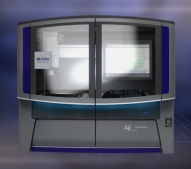Life Technologies launches SOLiD 5500 next-generation gene sequencer
9 Nov 2010
Life Technologies Corporation has launched the 5500xl SOLiD Sequencer, a new instrument designed to deliver fast and accurate genomic data for cancer biology and genetic disease research.
Developed and manufactured with long-standing partner Hitachi High-Technologies, the 5500xl builds on the SOLiD 4hq, which was first announced in January. Initial shipments of the 5500xl are planned for December 2010.
“The 5500xl represents a significant leap forward in next-generation sequencing,” said Mark Stevenson, Chief Operating Officer for Life Technologies. “We have revolutionized the biggest arsenal in our sequencing portfolio by evolving the instrument and the chemistries to better address the needs of translational researchers. Its unprecedented accuracy and rapid throughput make the 5500xl the ideal sequencing instrument for deciphering the genetic code of cancer, and paving the way for the future development of sequencing technologies for eventual use in clinical settings.”
 Building
on customer feedback, the SOLiD 4hq and SOLiD PI programs
were combined to develop a single, robust, easy-to-use platform for
all researchers. Current SOLiD 4 System customers will be offered a
cost-effective path to step up to the higher throughput 5500xl
system. The SOLiD PI system will be replaced by the affordable 5500
SOLiD Sequencer.
Building
on customer feedback, the SOLiD 4hq and SOLiD PI programs
were combined to develop a single, robust, easy-to-use platform for
all researchers. Current SOLiD 4 System customers will be offered a
cost-effective path to step up to the higher throughput 5500xl
system. The SOLiD PI system will be replaced by the affordable 5500
SOLiD Sequencer.
Masaya Kojima, General Manager of the Strategic Planning Division, Analytical Sciences Business Group for Hitachi High-Technologies Corporation, said, “Our long-standing relationship with Life Technologies speaks for itself, which started with their capillary electrophoresis (CE) 3100 sequencing business. This latest joint effort will surely bring another high-quality performance instrument into the next-generation sequencing arena.”
“We are looking forward to having the new 5500xl SOLiD Sequencers in our facility,” said Marco Marra, PhD, Director of the Genome Sciences Centre at the BC Cancer Agency. “Increased flexibility and accuracy in sequencing technology will improve our ability to identify and analyze novel mutations much more efficiently and accurately, significantly contributing to cancer research.”